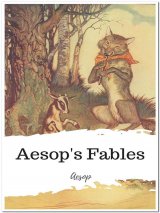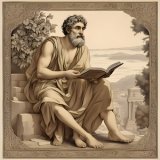Aesop's Fables Page #26
Aesop's Fables, or the Aesopica, is a collection of fables credited to Aesop, a slave and storyteller believed to have lived in ancient Greece between 620 and 564 BCE.
A Lion, infirm with age, lay sick in his den, and all the beasts of the forest came to inquire after his health with the exception of the Fox. The Wolf thought this was a good opportunity for paying off old scores against the Fox, so he called the attention of the Lion to his absence, and said, "You see, sire, that we have all come to see how you are except the Fox, who hasn't come near you, and doesn't care whether you are well or ill." Just then the Fox came in and heard the last words of the Wolf. The Lion roared at him in deep displeasure, but he begged to be allowed to explain his absence, and said, "Not one of them cares for you so much as I, sire, for all the time I have been going round to the doctors and trying to find a cure for your illness." "And may I ask if you have found one?" said the Lion. "I have, sire," said the Fox, "and it is this: you must flay a Wolf and wrap yourself in his skin while it is still warm." The Lion accordingly turned to the Wolf and struck him dead with one blow of his paw, in order to try the Fox's prescription; but the Fox laughed and said to himself, "That's what comes of stirring up ill-will." HERCULES AND PLUTUS When Hercules was received among the gods and was entertained at a banquet by Jupiter, he responded courteously to the greetings of all with the exception of Plutus, the god of wealth. When Plutus approached him, he cast his eyes upon the ground, and turned away and pretended not to see him. Jupiter was surprised at this conduct on his part, and asked why, after having been so cordial with all the other gods, he had behaved like that to Plutus. "Sire," said Hercules, "I do not like Plutus, and I will tell you why. When we were on earth together I always noticed that he was to be found in the company of scoundrels." THE FOX AND THE LEOPARD A Fox and a Leopard were disputing about their looks, and each claimed to be the more handsome of the two. The Leopard said, "Look at my smart coat; you have nothing to match that." But the Fox replied, "Your coat may be smart, but my wits are smarter still." THE FOX AND THE HEDGEHOG A Fox, in swimming across a rapid river, was swept away by the current and carried a long way downstream in spite of his struggles, until at last, bruised and exhausted, he managed to scramble on to dry ground from a backwater. As he lay there unable to move, a swarm of horseflies settled on him and sucked his blood undisturbed, for he was too weak even to shake them off. A Hedgehog saw him, and asked if he should brush away the flies that were tormenting him; but the Fox replied, "Oh, please, no, not on any account, for these flies have sucked their fill and are taking very little from me now; but, if you drive them off, another swarm of hungry ones will come and suck all the blood I have left, and leave me without a drop in my veins." THE CROW AND THE RAVEN A Crow became very jealous of a Raven, because the latter was regarded by men as a bird of omen which foretold the future, and was accordingly held in great respect by them. She was very anxious to get the same sort of reputation herself; and, one day, seeing some travellers approaching, she flew on to a branch of a tree at the roadside and cawed as loud as she could. The travellers were in some dismay at the sound, for they feared it might be a bad omen; till one of them, spying the Crow, said to his companions, "It's all right, my friends, we can go on without fear, for it's only a crow and that means nothing." Those who pretend to be something they are not only make themselves ridiculous. THE WITCH A Witch professed to be able to avert the anger of the gods by means of charms, of which she alone possessed the secret; and she drove a brisk trade, and made a fat livelihood out of it. But certain persons accused her of black magic and carried her before the judges, and demanded that she should be put to death for dealings with the Devil. She was found guilty and condemned to death: and one of the judges said to her as she was leaving the dock, "You say you can avert the anger of the gods. How comes it, then, that you have failed to disarm the enmity of men?" THE OLD MAN AND DEATH An Old Man cut himself a bundle of faggots in a wood and started to carry them home. He had a long way to go, and was tired out before he had got much more than half-way. Casting his burden on the ground, he called upon Death to come and release him from his life of toil. The words were scarcely out of his mouth when, much to his dismay, Death stood before him and professed his readiness to serve him. He was almost frightened out of his wits, but he had enough presence of mind to stammer out, "Good sir, if you'd be so kind, pray help me up with my burden again." THE MISER A Miser sold everything he had, and melted down his hoard of gold into a single lump, which he buried secretly in a field. Every day he went to look at it, and would sometimes spend long hours gloating over his treasure. One of his men noticed his frequent visits to the spot, and one day watched him and discovered his secret. Waiting his opportunity, he went one night and dug up the gold and stole it. Next day the Miser visited the place as usual, and, finding his treasure gone, fell to tearing his hair and groaning over his loss. In this condition he was seen by one of his neighbours, who asked him what his trouble was. The Miser told him of his misfortune; but the other replied, "Don't take it so much to heart, my friend; put a brick into the hole, and take a look at it every day: you won't be any worse off than before, for even when you had your gold it was of no earthly use to you." THE FOXES AND THE RIVER A number of Foxes assembled on the bank of a river and wanted to drink; but the current was so strong and the water looked so deep and dangerous that they didn't dare to do so, but stood near the edge encouraging one another not to be afraid. At last one of them, to shame the rest, and show how brave he was, said, "I am not a bit frightened! See, I'll step right into the water!" He had no sooner done so than the current swept him off his feet. When the others saw him being carried down-stream they cried, "Don't go and leave us! Come back and show us where we too can drink with safety." But he replied, "I'm afraid I can't yet: I want to go to the seaside, and this current will take me there nicely. When I come back I'll show you with pleasure." THE HORSE AND THE STAG There was once a Horse who used to graze in a meadow which he had all to himself. But one day a Stag came into the meadow, and said he had as good a right to feed there as the Horse, and moreover chose all the best places for himself. The Horse, wishing to be revenged upon his unwelcome visitor, went to a man and asked if he would help him to turn out the Stag. "Yes," said the man, "I will by all means; but I can only do so if you let me put a bridle in your mouth and mount on your back." The Horse agreed to this, and the two together very soon turned the Stag out of the pasture: but when that was done, the Horse found to his dismay that in the man he had got a master for good.
Translation
Translate and read this book in other languages:
Select another language:
- - Select -
- 简体中文 (Chinese - Simplified)
- 繁體中文 (Chinese - Traditional)
- Español (Spanish)
- Esperanto (Esperanto)
- 日本語 (Japanese)
- Português (Portuguese)
- Deutsch (German)
- العربية (Arabic)
- Français (French)
- Русский (Russian)
- ಕನ್ನಡ (Kannada)
- 한국어 (Korean)
- עברית (Hebrew)
- Gaeilge (Irish)
- Українська (Ukrainian)
- اردو (Urdu)
- Magyar (Hungarian)
- मानक हिन्दी (Hindi)
- Indonesia (Indonesian)
- Italiano (Italian)
- தமிழ் (Tamil)
- Türkçe (Turkish)
- తెలుగు (Telugu)
- ภาษาไทย (Thai)
- Tiếng Việt (Vietnamese)
- Čeština (Czech)
- Polski (Polish)
- Bahasa Indonesia (Indonesian)
- Românește (Romanian)
- Nederlands (Dutch)
- Ελληνικά (Greek)
- Latinum (Latin)
- Svenska (Swedish)
- Dansk (Danish)
- Suomi (Finnish)
- فارسی (Persian)
- ייִדיש (Yiddish)
- հայերեն (Armenian)
- Norsk (Norwegian)
- English (English)
Citation
Use the citation below to add this book to your bibliography:
Style:MLAChicagoAPA
"Aesop's Fables Books." Literature.com. STANDS4 LLC, 2025. Web. 12 Jan. 2025. <https://www.literature.com/book/aesop%27s_fables_316>.




Discuss this Aesop's Fables book with the community:
Report Comment
We're doing our best to make sure our content is useful, accurate and safe.
If by any chance you spot an inappropriate comment while navigating through our website please use this form to let us know, and we'll take care of it shortly.
Attachment
You need to be logged in to favorite.
Log In